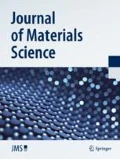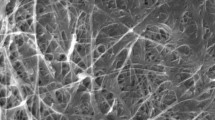Abstract
A network of entangled multiwall carbon nanotubes is presented as a conductor whose conductivity is sensitive to compressive stress both in the course of monotonic stress growth and when loading/unloading cycles are imposed. The testing has shown as much as 100% network conductivity increase at the maximum applied stress. It indicates favorable properties of multiwall carbon nanotube networks for their use as stress-electric signal transducers. To model the conductivity-stress dependence, it is hypothesized that compression increases local contact forces between nanotubes, which results in more conductive contacts. The lack of detailed knowledge of the mechanism as well as an unclear shift from individual contacts to the whole network conductance behavior is circumvented with a statistical approach. In this respect, good data representation is reached using Weibull distribution for the description of distribution of nanotube contact resistance.







Similar content being viewed by others
References
Thostenson ET, Li CY, Chou TW (2005) Compos Sci Technol 65:491
Cao Q, Rogers JA (2009) Adv Mater 21:29
Walters DA, Casavant MJ, Quin XC, Huffman CB, Boul PJ, Ericson LM, Haroz EH, O’Connel MJ, Smith K, Colbert DT, Smalley RE (2001) Chem Phys Lett 338:14
Poquillon D, Viguier B, Andrieu E (2005) J Mat Sci 40:5963. doi:10.1007/s10853-005-5070-1
Allaoui A, Hoa SV, Evesque P, Bai J (2009) Scripta Mater 6:628
Kukowecz A, Smajda R, Oze M, Schaefer B, Haspel H, Konya Z, Kiricsi I (2008) Phys Stat Sol 245:2331
Simsek Y, Ozyuzer L, Seyham AT, Tanoglu M, Schulte K (2007) J Mater Sci 42:9689. doi:10.1007/s10853-007-1943-9
Chang L, Friedrich K, Ye L, Toro P (2009) J Mater Sci 44:4003. doi:10.1007/s10853-009-3551-3
Ham HT, Choi YS, Chung IJ (2005) Colloid Interf Sci 286:216
Kimmer D, Slobodian P, Petras D, Zatloukal M, Olejník R, Saha P (2009) J Appl Polym Sci 111:2711
Wang D, Song PC, Liu CH, Wu W, Fan SS (2008) Nanotechnology 19(7):1
Ashrafi B, Guan JW, Mirjalili V, Hubert P, Simard B, Johnston A (2010) COMPOS PART A-APPL S 41(9):1184
Xie XL, Mai YW, Zhou XP (2005) Mater Sci Eng 49:89
Yaglioglu O, Hart AJ, Martens R, Slocum AH (2006) Rev Sci Instrum 77:095105/1
Acknowledgements
This project was financially supported by the Ministry of Education, Youth and Sports of the Czech Republic (MSM 7088352101), the Grant Agency of the Academy of Sciences of the Czech Republic (GAAV IAA200600803) and by the Fund of the Institute of Hydrodynamics AV0Z20600510.
Author information
Authors and Affiliations
Corresponding author
Rights and permissions
About this article
Cite this article
Slobodian, P., Riha, P., Lengalova, A. et al. Compressive stress-electrical conductivity characteristics of multiwall carbon nanotube networks. J Mater Sci 46, 3186–3190 (2011). https://doi.org/10.1007/s10853-010-5202-0
Received:
Accepted:
Published:
Issue Date:
DOI: https://doi.org/10.1007/s10853-010-5202-0




